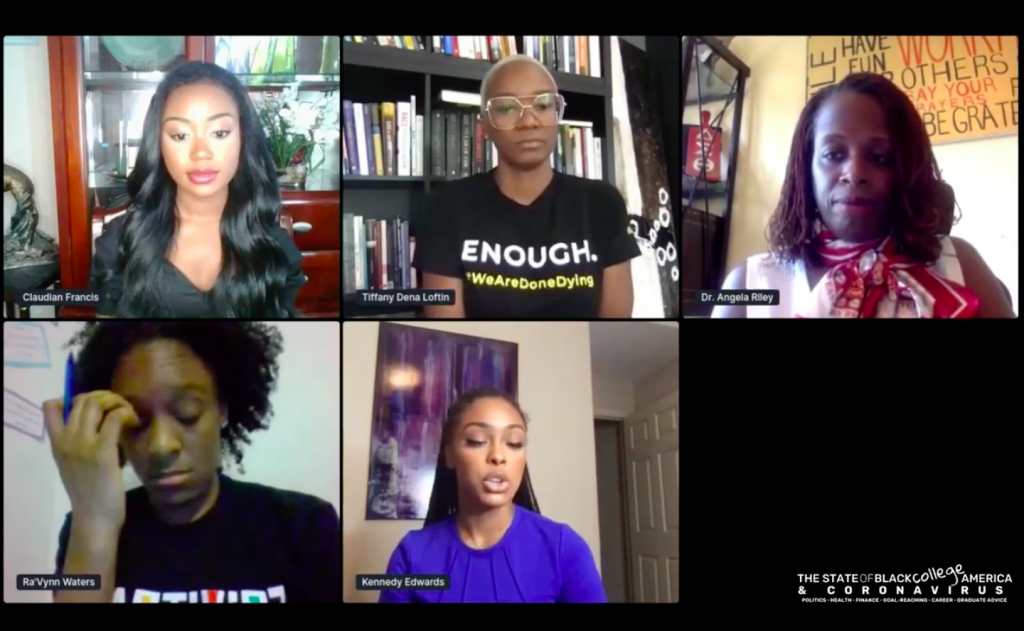Over the summer, a virtual conference was held to discuss college life during the coronavirus pandemic for Black students.
In a joint effort by Binghamton University’s National Association for the Advancement of Colored People (NAACP) and Multicultural Resource Center (MRC), the digital conference, titled the State of Black College America and Coronavirus, was held on June 28. Now available on YouTube, the meeting facilitated discussions between prominent Black guests, students and leaders in a span of four panels.
The host of the event was Claudian Francis, a junior who has an individualized double-major in economics and strategic, legal and business communications. According to Francis, the purpose of the virtual conference was to empower and motivate Black college students during the uncertain times of the pandemic.
“In wake of the coronavirus pandemic, my peers and I were all overwhelmed by everything going on,” Francis wrote in an email. “With classes transitioning to [online] and internships being canceled, this ‘new normal’ felt anything but normal. On top of that, knowing that people of color are disproportionately affected by this pandemic motivated me to discover ways to positively impact the community during these times. I thought it’d be a great idea to create a space where Black college students can come together, engage in candid conversations and learn how to move forward stronger and better than ever.”
In the two commencement speeches, speakers Andreia Gibau, Miss New York USA 2020, and Kennedy Edwards, Miss Texas Teen USA 2019 and a junior at Howard University, talked about how the African American community is disproportionately affected by the coronavirus and law enforcement due to issues of systemic racism. These speakers encouraged Black voices and voting to change the system.
One of the panelists was Binghamton City Councilwoman Angela Riley, executive director of experiential education and assistant dean of BU’s School of Pharmacy and Pharmaceutical Sciences. Riley spoke about the hardships that people of color may face, which could worsen their situation during the pandemic.
“African Americans, because of systemic racism in place for over 400 years, have led us not only to have barriers in the health care system, but other social determinants of health have been limited,” Riley said. “We don’t have access to quality fresh food. We are working jobs where we don’t have the vacation or time afforded to us to take care of what we need to maintain our health.”
The next two panels shifted the topic to college, as it featured perspectives from both graduate and undergraduate students. The graduate panel had guests like Shenna Woods, a graduate of Spelman College, and facilitated discussions on things to do while stuck at home, steps undergraduates could take to succeed and balancing finances. On the undergraduate panel, there was a conversation between student leaders from different universities, including Khaleel James, president of BU’s Student Association (SA) and a senior double-majoring in economics and human development. This panel focused on specific topics, such as improving Black representation in student bodies or governments and adapting to online environments and classes.
The fourth panel discussed maintaining physical and mental health during the pandemic. With speakers like filmmaker Heman Armstrong, ‘18, the final panel talked about how communities of color can respond to the stress and anxiety brought on by the coronavirus and recent protests as well as overcome the stigma around mental health issues.
To end the conference, Francis invited the closing speaker Imani Ellis, founder of Creative Collective NYC, an agency that promotes creators of color in NYC. In her speech, Ellis advised Black creators on how they can succeed, as well as general tips, like how one could make themselves valuable in a job or internship.
With the conclusion of the virtual meeting, Francis expressed her gratitude for the sponsors and panelists.
“[‘The State of Black College America and Coronavirus’] was energizing, motivational, fun and highly informative,” Francis wrote. “All of the panelists were awesome. It could not have been done without the [BU] Chapter of the NAACP, and the MRC and [Division of Diversity, Equity and Inclusion’s] support to pull the vision together.”
However, while she thought the conference was highly helpful, Francis believes there is more work to be done.
“I also think, however, that a conversation is like a springboard,” Francis wrote. “Meaning, that’s it’s important to now use this information and advice in productive and meaningful ways, whether that looks like being an organizer in your own community, running for student government office, using your art as a form of activism, learning how to prioritize your mental health [or] coming to NAACP’s [general interest meeting]. Whatever that looks like for you. There are so many things to take away from the whole event. There is always more work to be done, and I think having those complex, yet needed conversations is the first step forward.”



